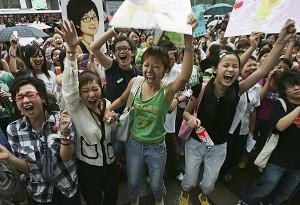The “Super Female Voice” competition that heated up China for more than six months has finally come to an end. This social phenomenon left much room for discussions. More than 8 million people expressed their opinions through modern mobile messaging technology, perhaps foreshadowing democracy in the future. Because of this competition, a regular girl-next-door entered the performing arts scene through an unorthodox and unprecedented method, colliding with monopolized central-levelled media. This is a matter that has the Beijing propaganda department worried.
According to Mingpao News, there were more than 8 million people who used modern technology (one entry per person) to express their opinions during the singing contest. Such voting expression was a “dream come true” for the Chinese people; they could also use this modern method to express their opinions on social policies and political issues.
The current election system in mainland China, electing people by listening to their social policies, is very ambiguous and unclear. The election system of the “Super Female Voice” will impact the development of democracy in the future; indeed it deserves valuable attention. In the report, on the surface, “Super Female Voice” obviously mimicked the United States television show, “American Idol.” Its slogan was “sing if you want to sing.” Anyone who thought they had the ability to sing could obviously use this opportunity to realize their dreams. Here, the notion of individualism is very clear.
The major characteristic of the program was breaking through the traditional judging system, changing to selection by audience. Votes for the semi-final round reached 4 million, and votes for the final round exceeded 8.15 million votes. The show did not attract such an audience because of the skill and talent of the contestants, but rather because of how the hosts and directors sold the show to the people, garnering cheers and showing acknowledgement of the viewers. Furthermore, they focused especially on a good atmosphere and spirit of the competition, with money as an incentive for the audience to vote.
In addition, “Super Female Voice” also broke the China Central Television (CCTV) Stars’ monopoly over media and performing arts. Once the CCTV’s monopoly is broken, Beijing will use all methods of crude prohibition to maintain ideological control–what other options do they have? This caused a major dilemma for Beijing officials.
Rumors say that this year’s “Super Female Voice” will be the first and last of its shows. It will not be allowed to continue next year. Beijing official’s anxieties and disapproval are obvious.
